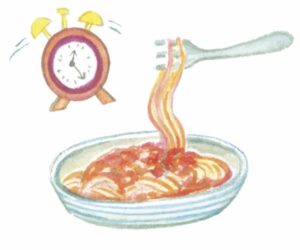
Just because you can go long periods of time without eating doesn’t mean it’s a good idea. Skipping meals might be more convenient if you have a busy schedule that leaves little time for eating, but as far as your health goes, you’ll fare better if you eat more frequently. This doesn’t mean you have to eat six or more times per day. If you like to eat three bigger meals and no snacks, that’s fine. If you prefer to eat smaller meals, shoot for three meals and two snacks. The key is to find what works for you and to be consistent.
Here are some things to think about:
- Eat a good breakfast. This will help set the stage for your eating habits the rest of the day. Those who skip breakfast find themselves overeating later in the day and are more likely to make poor food choices. Think about it—it’s much easier to turn down a donut or pastry if you’ve already eaten breakfast and aren’t hungry, and it’s definitely easier to eat slowly and listen to internal hunger cues when you aren’t ravenous.
- Pack some snacks. If you are going to be gone all day, keep some snacks in your office desk, car, or purse. You never know when you might get hungry and having something nutritious to reach for makes it easier to turn down the packaged snacks or beverages that are typically full of sugar and calories.
- Plan your lunch. Whether you pack a lunch or order takeout from your favorite restaurant, a little planning will do you good. Deciding what to eat in a time crunch or when you are hungry is never a good idea, since you often choose the less healthy options. Plan ahead and you’ll find yourself building a balanced meal that is both nutritious and tasty.
- Plan your dinner. Just like with lunch, don’t wait until dinner time to decide what to eat. After a long day, your ability to make healthy decisions has gone out the door. You’ll either find yourself in the drive-thru ordering a hamburger and fries or you’ll fill up on chips and other snack foods as you walk around your kitchen trying to decide what to eat for dinner.
